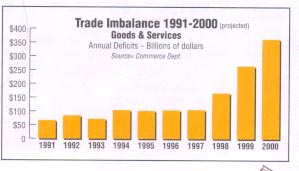| Any hope for at least avoiding an increase
in the rate of export of manufacturing jobs to Third World countries
has been dealt a serious blow with the announcement of George W.
Bush's choice for U.S. trade representative.
That choice is Robert B. Zoellick, 47, who was described by a
reporter in the Washington Post as a "dogmatic free trader"
and a "Republican attack dog" on trade.
In the latter role, in the past year Zoellick has accused President
Clinton and Vice President Gore of "craven pandering to
protectionists in the labor and environmental movements,"
reported Steven Pearlstein in the Post. Zoellick also severely
criticized efforts to require that new trade agreements include
assurances of enforcement of minimum labor and environmental
standards.
He was a top aide to Robert A. Baker III at the Treasury and State
Departments, and at the White House, during the presidencies of Ronald
Reagan and the new President Bush's father. Zoellick also had a direct
hand in shaping the North American Free Trade Agreement (NAFTA) and
the World Trade Organization (WTO) and now wants to fashion free trade
with Europe and Central South America.
News of Zoellick's nomination came just weeks after the government
announced that the nations foreign-trade deficit in goods and services
last October was $33.2 billion and for all of 2000 will be a record
$363 billion. The previous record, set in 1999, was $265 billion.
The highest single-country trade deficit continued to be with
China, up by 4% to $9.1 billion, followed by Japan, $8.4 billion,
Western Europe, $6.1 billion, and Canada, $4.7 billion.
Textile and clothing imports were up by 17.2% in October, the U.S.
Commerce Dept. reported. It was the 13th of the last 14 months to see
a double-digit gain in the deficit for the sector, Women's Wear Daily
reported.
The American Textile Institute reported that Honduras moved into
second place among nation's shipping clothing to the U.S., behind only
Mexico, but now ahead of China and Bangladesh.
Clothing manufacturers in the U.S. employed 42,000 fewer workers in
October than they had the same month the year before, while textile
mills employed 16,000 fewer, reported the Crafted with Pride in the
U.S.A. Council, Inc.
Overall, in the previous 12 months a total of 123,000 U.S.
manufacturing jobs "disappeared," the Council pointed out.
Despite these disturbing trends and developments, however, "we
must continue to remind members of Congress that the American dream
will only be kept alive by retaining a solid base of manufacturing
jobs—the kind that built our nation," said Charles E. Mercer,
president of the Union Label & Service Trades Dept., AFL-CIO.
At the same time, he said, we must continue to do all we can to buy
union-made, American-made products.

|

